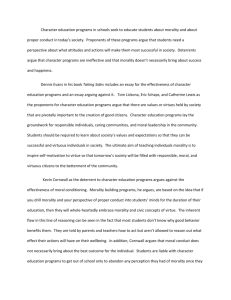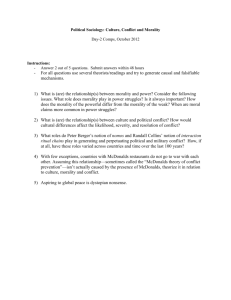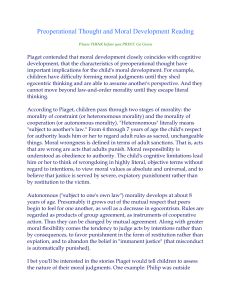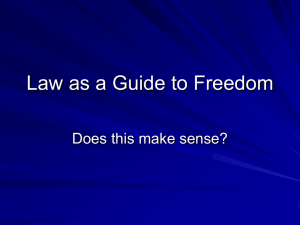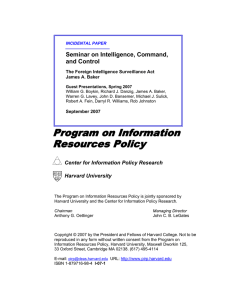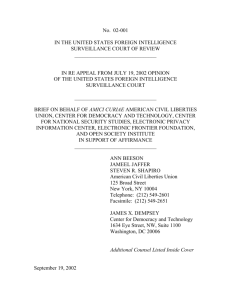Jo Oh Constitution Neg
advertisement
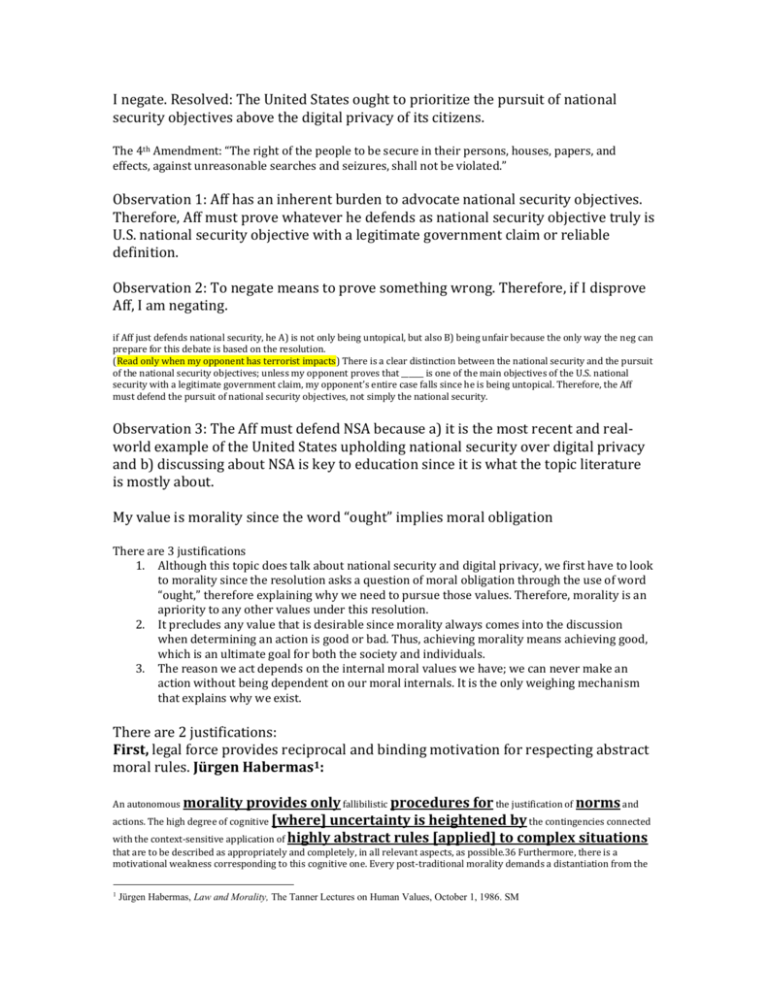
I negate. Resolved: The United States ought to prioritize the pursuit of national security objectives above the digital privacy of its citizens. The 4th Amendment: “The right of the people to be secure in their persons, houses, papers, and effects, against unreasonable searches and seizures, shall not be violated.” Observation 1: Aff has an inherent burden to advocate national security objectives. Therefore, Aff must prove whatever he defends as national security objective truly is U.S. national security objective with a legitimate government claim or reliable definition. Observation 2: To negate means to prove something wrong. Therefore, if I disprove Aff, I am negating. if Aff just defends national security, he A) is not only being untopical, but also B) being unfair because the only way the neg can prepare for this debate is based on the resolution. (Read only when my opponent has terrorist impacts) There is a clear distinction between the national security and the pursuit of the national security objectives; unless my opponent proves that ______ is one of the main objectives of the U.S. national security with a legitimate government claim, my opponent’s entire case falls since he is being untopical. Therefore, the Aff must defend the pursuit of national security objectives, not simply the national security. Observation 3: The Aff must defend NSA because a) it is the most recent and realworld example of the United States upholding national security over digital privacy and b) discussing about NSA is key to education since it is what the topic literature is mostly about. My value is morality since the word “ought” implies moral obligation There are 3 justifications 1. Although this topic does talk about national security and digital privacy, we first have to look to morality since the resolution asks a question of moral obligation through the use of word “ought,” therefore explaining why we need to pursue those values. Therefore, morality is an apriority to any other values under this resolution. 2. It precludes any value that is desirable since morality always comes into the discussion when determining an action is good or bad. Thus, achieving morality means achieving good, which is an ultimate goal for both the society and individuals. 3. The reason we act depends on the internal moral values we have; we can never make an action without being dependent on our moral internals. It is the only weighing mechanism that explains why we exist. There are 2 justifications: First, legal force provides reciprocal and binding motivation for respecting abstract moral rules. Jürgen Habermas1: An autonomous morality provides only fallibilistic procedures for the justification of norms and actions. The high degree of cognitive [where] uncertainty is heightened by the contingencies connected with the context-sensitive application of highly abstract rules [applied] to complex situations that are to be described as appropriately and completely, in all relevant aspects, as possible.36 Furthermore, there is a motivational weakness corresponding to this cognitive one. Every post-traditional morality demands a distantiation from the 1 Jürgen Habermas, Law and Morality, The Tanner Lectures on Human Values, October 1, 1986. SM unproblematical background of established and taken-for- granted forms of life. Moral judgments, decoupled from concrete ethical life (Sittlichkeit), no longer immediately carry the motivational power that converts judgments into actions. The more that morality is internalized and made autonomous, the more it retreats into the private sphere. In all spheres of action where conflicts and pressures for regulation call for unambiguous, timely, and binding decisions, legal norms must absorb the contingencies that would emerge if matters were left to strictly moral guidance. The complementing of morality by coercive law can itself be morally justified. In this connection K. O. Apel speaks of the problem of the warranted expectation of an exacting universalistic morality. 37 That is, even morally well-justified norms may be warrantedly expected only of those who can expect that all others will also behave in the same way. For only under the condition of a general observance of norms do reasons that can be adduced for their justification count. Now, if a practically effective bindingness cannot be generally expected from moral insights, [Therefore,] adherence to corresponding norms is reasonable, from the perspective of an ethic of responsibility, only if they are enforced, that is, if they acquire [by] legally binding force. Important characteristics of positive law become intelligible if we conceive of [the] law from this angle of compensate[es]ing for the weaknesses of an autonomous morality. [because] L[l]egal norms borrow their binding force from the government’s potential for sanctions. They apply to what Kant calls the external aspect of action, not to motives and convictions, which cannot be controlled. Moreover, the professional administration of written, public, and systematically elaborated law relieves legal subjects of the effort that is demanded from moral persons when they have to resolve their conflicts on their own. And finally, positive law owes its conventional features to the fact that it can be enacted and altered at will by the decisions of a political legislature. This dependence on politics also explains the instrumental aspect of law. Whereas moral norms are always ends in them- selves, legal norms are also means for realizing political goals. That is, they serve not only the impartial settlement of conflicts of action but also the realization of political programs. Collective goalattainment and the implementation of policies owe their binding force to the form of law. In this respect, law stands between politics and morality. This is why, as Dworkin has shown, in judicial discourse, arguments about the application and interpretation of law are intrinsically connected with policy arguments as well as with moral arguments. Legal force is the foundation of the government’s power and the guideline for how it functions; it grants government power to give sanctions and maintain peace. Strong government power is crucial in achieving morality because the social norms society defines as moral cannot be enforced without it; an anarchy will simply be the outcome. If morality were inconsistent with constitutional obligation, it would require the nation to literally act against itself. I contend that taking away U.S. citizens’ digital privacy in pursuit of national security violates the 4th amendment. Donohue2 writes: The National Security Agency’s recently revealed surveillance programs undermine the purpose of the Foreign Intelligence Surveillance Act, which was established to prevent this kind of overreach. They violate the Fourth Amendment’s guarantee against unreasonable search and seizure. And they underscore the dangers of growing executive power. The intelligence community has a history of overreaching in the name of national security. In the mid-1970s, it came to light that, since the 1940s, the NSA had been collecting international telegraphic traffic from companies, in the process obtaining millions of Americans’ telegrams that were unrelated to foreign targets. From 1940 to 1973, the CIA and the FBI engaged in covert mail-opening programs that violated laws prohibiting the interception or opening of mail. The agencies also conducted warrantless “surreptitious entries,” breaking into targets’ offices and homes to photocopy or steal business records and personal documents. The Army Security Agency intercepted domestic radio communications. And the Army’s CONUS program placed more than 100,000 people under surveillance, including lawmakers and civil rights leaders. After an extensive investigation of the agencies’ actions, Congress passed the 1978 Foreign Intelligence Surveillance Act (FISA) to limit sweeping collection of intelligence and create rigorous oversight. But 35 years later, the NSA is using this law and its subsequent amendments as legal grounds to run even more invasive programs than those that gave rise to the statute. We’ve learned that in April, the Foreign Intelligence Surveillance Laura K. Donohue, [Professor of Law at Georgetown Law and the Director of Georgetown’s Center on National Security and the Law] “NSA Surveillance may be legal – but it’s unconstitutional,” The Washington Post, June 21st, 2013. SM 2 Court (FISC) ordered Verizon to provide information on calls made by each subscriber over a three-month period. Over the past seven years, similar orders have been served continuously on AT&T, Sprint and other telecommunications providers. Another program, PRISM, disclosed by the Guardian and The Washington Post, allows the NSA and the FBI to obtain online data including e-mails, photographs, documents and connection logs. The information that can be assembled about any one person — much less organizations, social networks and entire communities — is staggering: What we do, think and believe. The government defends the programs’ legality, saying they comply with FISA and its amendments. It [would] may be right, but only because FISA has ceased to [be] provide a meaningful constraint. Under the traditional FISA, if the government wants to conduct electronic surveillance, it must make a classified application to a special court, identitying or describing the target. It must demonstrate probable cause that the target is a foreign power or an agent thereof, and that the facilities to be monitored will be used by the target. In 2008, Congress added section 702 to the statute, allowing the government to use electronic surveillance to collect foreign intelligence on non-U.S. persons it reasonably believes are abroad, without a court order for each target. A U.S. citizen may not intentionally be targeted. To the extent that the FISC sanctioned PRISM, it may be consistent with the law. But it is disingenuous to suggest that millions of Americans’ emails, photographs and documents are “incidental” to an investigation targeting foreigners overseas. The telephony metadata program raises similar concerns. FISA did not originally envision the government accessing records. Following the 1995 Oklahoma City bombing, Congress allowed applications for obtaining records from certain kinds of businesses. In 2001, lawmakers further expanded FISA to give the government access to any business or personal records. Under section 215 of the Patriot Act, the government no longer has to prove that the target is a foreign power. It need only state that the records are sought as part of an investigation to protect against terrorism or clandestine intelligence. This means that FISA can now be used to gather records concerning individuals who are neither the target of any investigation nor an agent of a foreign power. Entire databases — such as telephony metadata — can be obtained, as long as an authorized investigation exists. Congress didn’t pass Section 215 to allow for the wholesale collection of information. As Rep. F. James Sensenbrenner Jr. (R-Wis.), who helped draft the statute, wrote in the Guardian: “Congress intended to allow the intelligence communities to access targeted information for specific investigations. How can every call that every American makes or receives be relevant to a specific investigation?” As a constitutional matter, the Supreme Court has long held that, where an individual has a reasonable expectation of privacy, search and seizure may occur only once the government has obtained a warrant, supported by probable cause and issued by a judge. The warrant must specify the places to be searched and items to be seized. There are exceptions to the warrant requirement. In 1979 the court held that the use of a pen register to record numbers dialed from someone’s home was not a search. The court suggested that people who disclose their communications to others assume the risk that law enforcement may obtain the information. More than three decades later, digitization and the explosion of social-network technology have changed the calculus. In the ordinary course of life, third parties obtain massive amounts of information about us that, when analyzed, have much deeper implications for our privacy than before. As for Section 702 of FISA, the Supreme Court has held that the Fourth Amendment does not protect foreigners from searches conducted abroad. But it has never recognized a foreign intelligence exception to the warrant requirement when foreign-targeted searches result in the collection of vast stores of citizens’ communications. Americans reasonably expect that their movements, communications and decisions will not be recorded and analyzed by the government. A majority of the Supreme Court seems to agree. Last year, the court considered a case involving 28-day GPS surveillance. Justice Samuel Alito suggested that in most criminal investigations, long-term monitoring “impinges on expectations of privacy.” Justice Sonia Sotomayor recognized that following a person’s movements “reflects a wealth of detail about her familial, political, professional, religious, and sexual associations.” [The FISC is supposed to operate as a check. But it is a secret court, notorious for its low rate of denial. From 1979 to 2002, it did not reject a single application]. Over the past five years, out of nearly 8,600 applications, only two have been denied. Congress has an opportunity to create more effective checks on executive power. It could withdraw Sections 215 and 702 and introduce new measures to regulate intelligence collection and analysis. There are many options. James Madison put it best: “In framing a government which is to be administered by men over men, the great difficulty lies in this: you must first enable the government to control the governed; and in the next place oblige it to control itself.”


